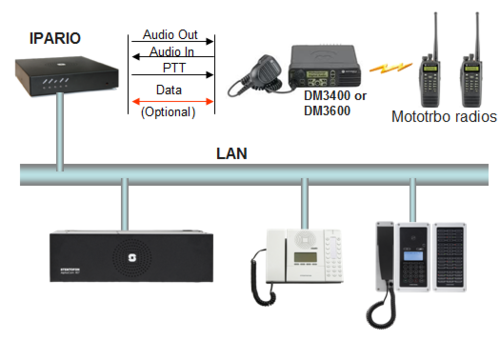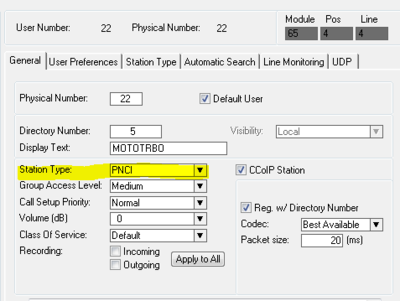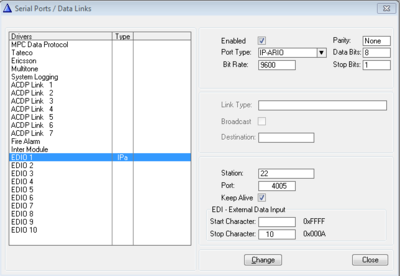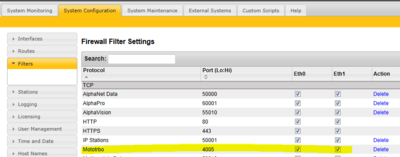Mototrbo and AlphaCom interfacing: Difference between revisions
From Zenitel Wiki
| Line 173: | Line 173: | ||
stop | stop | ||
ENDIF | ENDIF | ||
$DSPL L%1.dir U18 0312 '' | $DSPL L%1.dir U18 0312 ' ' | ||
Revision as of 08:32, 24 October 2012
This article describes how the AlphaCom can be integrated to the digital radio system MOTOTRBO from Motorola. Most suitable radio model is DM3600 (display model), but for basic functionality also DM3400 can be used. The interface between AlphaCom and the MOTOTRBO radio is the IP-ARIO unit.
Functionality
Increased functionality is achieved when using data communication between the AlphaCom and the MOTOTRBO radio. The MOTOTRBO Extended Control and Management Protocol (XCMP) allows the AlphaCom to control and manage the MOTOTRBO radio. If more than groupcall functionality is required, an XCMP converter model DMR621 from Motorola is required. The converter is connected to the serial port on the IP-ARIO (RS232) and to the accessory port on MOTOTRBO radio (USB).
Without XCMP converter
- Without the XCMP converter intercom stations in a Simplex Conference can communicate with a Group Call in the MOTOTRBO radio system. There will be no caller ID in the intercom stations.
With XCMP converter
With the XCMP converter and EventHandler configuration the following functionality has been tested:
- Groupcall in fixed group (M-key is PTT)
- Semi-duplex (Press To Talk) private call to selectable MOTOTRBO radio
- Incoming private call from a MOTOTRBO radio to predefined intercom station. Call to selectable intercom station is not supported.
- Send text message to a preselected MOTOTRBO radio
- Display of Caller ID
Connections
Connections between the MOTOTRBO radio and IP-ARIO:
- RX audio to Radio IN (Motorola 770 mV nom.)
- TX audio to Radio OUT (Motorola 80 mV nom.)
- PTT to RCO output (active low)
- Audio is asymmetric, DC-block capacitor is required in TX audio line to radio.
- Ignition input of the radio needs to be connected to +12V to power-up the radio automatically.
- Optional: XCMP converter. The adapter is connected to the serial port on the IP-ARIO and to the accessory port on MOTOTRBO radio (USB).
Configuration
Assumptions
The following parameters are used in the configuration examples:
- IPARIO is using directory number 5
- RCO 22 is used for keying of the radio transmitter
- Simplex Conference 1 (8201) is used for radio listen/talk
- UDD 500: The number of digits in the Radio ID
- UDD 501: The number of digits currently dialed when doing selective call to MOTOTRBO radio
- UDD 502: The complete collected number during dialing
- UDD 503: The directory number of the station currently in conversation with the IP-ARIO
- UDD 504: The Radio ID of the current talker in the MOTOTRBO system
- TCP/IP port 4005 is used for communication between AlphaCom and IP-ARIO
You can choose to use other parameters, but then you must carefully study each step and adjust the configuration accordingly.
IP-ARIO configuration
Configure the IP ARIO to register to the AlphaCom using directory number 5, see describtion in the IPARIO article. Note that an IPARIO license is required in the AMC-IP.
- In Users & Stations -> General tab, set Station Type = PNCI. This is to allow transparent dialing while connected to the IP-ARIO, without the digits being intepreted by the AlphaCom.
- In the Station Type tab, enable "Request for Audio License".
EDIO Port
Configure the EDIO 1 port of AlphaCom to use the RS232 serial port of the IP-ARIO:
- In Exchange & System -> Serial Ports, select EDIO 1, and set the following parameters:
- Port Type: IPARIO
- Bit rate = 9600, Parity = None, Data bits = 8, Stop bits = 1.
- Station = Physical number of the IPARIO
- Port = 4005. This is the TCP/IP port used between AlphaCom and the IPARIO. Note: This port must be defined and opened in the Filters settings in AlphaWeb.
- Keep Alive = Enabled
- Stop character = 10
Simplex Conference
Configure the IP-ARIO to be Default Speaker in Simplex Conference 1:
Event Handler
LOG statements are included for debug purposes only. Might be useful to watch the System Log in case things doesn't work as expected.
Event 1:
Operate the RCO 22 (PTT) when M-key is pressed in Simplex Conference:
Event Owner: IP-ARIO Event Type: 1 - Audio Sub Event: 64 (Program Conference) When Change To: ON or OFF Action: RCO 22
Event 2:
This event is used for selective dialing to MOTOTRBO radios. The event collects the digits dialed while connected to the IP-ARIO (5). It checks that the digit pressed is between 0 and 9, and collects 4 digits (The line "WUDD 500 4" can be modified if less or more digits are wanted). When 4 digits are collected, it will send an "AT+CCR" command on the EDO port, setting up a private call to the selected radio ID. The PTT (RCO 22) is pulsed to establish the call, and the digit counter (UDD 501) and the collected number (UDD 502) are cleared.
Event Owner: Stations w. UDP. ID: 8 Event Type: 25 Event Trigger w/User Parameter Sub Event: 255 When Change To: ON or OFF When Related To: Directory Number. Id: 5 Action: IF %op(%sev,>=,0) IF %op(%sev,<=,9) IF %chg(1,0) WUDD 500 4 WUDD 501 %op(%udd(501),+,1) WUDD 502 %op(%op(%udd(502),*,10),+,%sev) IF %op(%udd(501),=,%udd(500)) $DSPL L%1.dir U18 0312 'Call: %udd(502) M=PTT' EDO 1 "AT+CCR=1,4,1,%udd(502)\r" LOG "=> AT+CCR=1,4,1,%udd(502)" RCO 22 ON 5 WUDD 501 0 WUDD 502 0 ENDIF ENDIF ENDIF ENDIF
Event 3:
Operate the RCO 22 (PTT) when M-key is pressed while in point-to-point communication with the IP-ARIO. The event checks that the station pressing the M-button is connected to the IP-ARIO. If this is the case, the RCO 22 is operated.
Event Owner: Stations w. UDP. ID: 8 Event Type: 31 - M-key Sub Event: 0 When Change To: ON or OFF When Related To: All Action: IF %op(%1.dir,=,%udd(503)) RCO 22 ENDIF
Event 4:
When the IP-ARIO receives a call, the calling station's directory number is stored in UDD 503. This information is used in the previous "Event 3" for PTT operation. When the conversation starts, the digit counter (UDD 501) and the collected number (UDD 502) are cleared, and the call is forced in simplex mode from the IPARIO towards the caller to ensure that the caller will hear the audio from the radio.
Event Owner: IP-ARIO Event Type: 7 - Conversation Incoming When Change To: ON or OFF When Related To: All Action: WUDD 503 %chg(%2.dir,0) IF %chg(1,0) WUDD 501 0 WUDD 502 0 $SIMP L%1.dir U0 U1 ENDIF
Event 5:
When a call is initiated from the radio to an intercom station, the called station's directory number is stored in UDD 503. This information is used in the previous "Event 3" for PTT operation. The call is forced in simplex mode from the IPARIO towards the caller to ensure that the caller will hear the audio from the radio. The intercom station will receive the Radio ID (i.e. the ID of the MOTOTRBO radio currently talking) in the display, as stored in UDD 504.
Event Owner: IP-ARIO Event Type: 8 - Conversation Outgoing When Change To: ON or OFF When Related To: All Action: WUDD 503 %chg(%2.dir,0) $SIMP L%1.dir U1 U1 $DSPL L%2.dir U18 0312 'Radio: %udd(504)'
Event 6:
This event is used to update the "Caller ID" in the display of all stations listening to Simplex Conference 1 (8201). When a radio is using the PTT button, this is reported to the AlphaCom via the EDI port. The EDI script executes the $VOX command when the PTT is pressed or released, which will trigger this event and upgrade the display accordingly. The actual Radio ID is stored in UDD 504.
Event Owner: Stations w. UDP. ID: 8 Event Type: 16 - Simplex Conference Audio Sub Event: 0 When Change To: ON or OFF When Related To: Directory Number. Id: 8201 Action: IF %chg(1,0) $DSPL L%1.dir U18 0312 'Radio: %udd(504)' stop ENDIF $DSPL L%1.dir U18 0312 ' '
Event 7:
This event is triggered when a text string is received from the radio.
Event Owner: EDI Text Config Event Type: 28 - EDI Text Sub Event: 1 Action: LOG "<= EDI: %edi" TMP 0 "%sscan(%edi,+)" IF %scmp(%scutf(%TMP(0), ,0),+XCMP-CALLCTRLBRDCST) TMP 1 "%scutc(%TMP(0),21,0)" TMP 2 "%scutc(%scutf(%TMP(1),\,,0),9,0)" TMP 3 "%scutc(%scutf(%TMP(1),\,,1),10,0)" TMP 4 "%scutc(%scutf(%TMP(1),\,,2),11,0)" WUDD 504 %tmp(2) LOG "=> EDI: Call from: %TMP(2)" LOG "=> EDI: Call Type: %TMP(3)" LOG "=> EDI: Call State: %TMP(4)" IF %op(%TMP(4),=,1) LOG "=> EDI: New Incoming call" IF %op(%TMP(3),=,4) $CALL L5 L102 W64 ENDIF ENDIF IF %op(%TMP(4),=,2) LOG "=> EDI: Call in progress" IF %op(%TMP(3),=,4) $DSPL L%udd(503) U18 0312 'Radio: %TMP(2)' ENDIF IF %op(%TMP(3),=,6) $VOX U01 L8201 ENDIF ENDIF IF %op(%TMP(4),=,3) LOG "=> EDI: End of Call" IF %op(%TMP(3),=,4) $C L5 ENDIF IF %op(%TMP(3),=,6) $VOX U00 L8201 ENDIF ENDIF IF %op(%TMP(4),=,7) LOG "=> EDI: Call ceased: %TMP(2)" ENDIF ENDIF
Event 8:
Send text message to a radio: It is possible by using the "AT+TMSC" command to send a text message to a selective radio. This event will send the text message "PLEASE REPORT TO CCR" to the radio with Radio IP address 12.0.3.236 when event trigger 9533 is dialed. The text message can of course be triggered by any other event. The Radio IP address is calculated from the CAI address and the Radio ID, see separate paragraph.
Event Owner: Stations w. UDP. ID: 8 Event Type: 15 Event Trigger Sub Event: 255 When Change To: ON When Related To: Directory Number. Id: 9533 Action: EDO 1 "AT+TMSC=12.0.3.236, PLEASE REPORT TO CCR\r"





